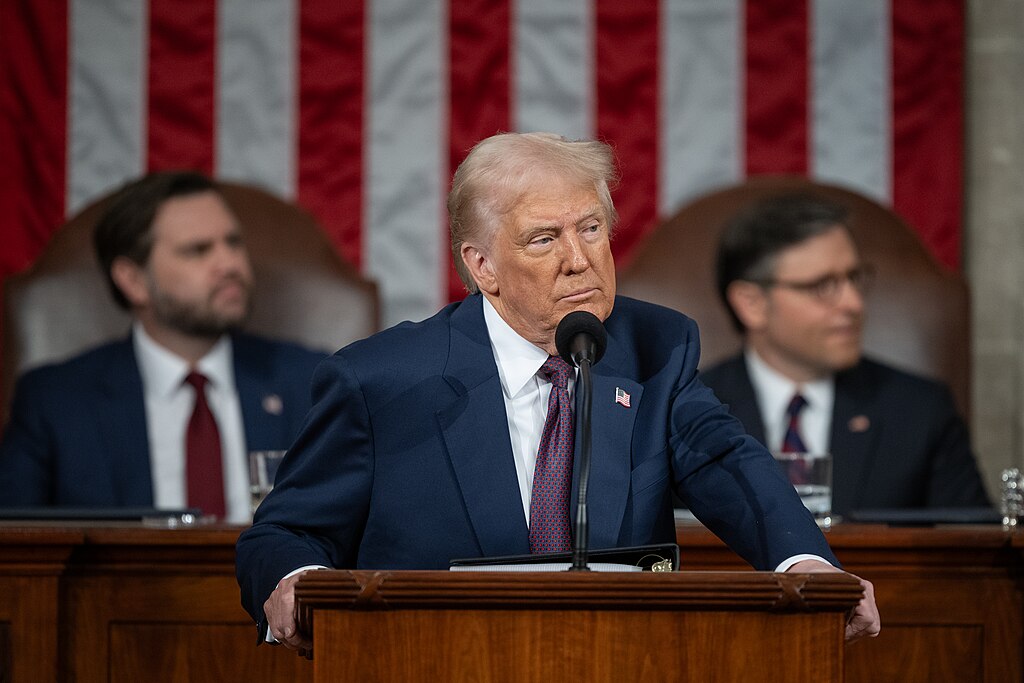U.S. President Donald Trump announced plans to impose a 25% tariff on all foreign-made cars and light trucks starting April 2, intensifying his protectionist trade agenda. Speaking at the White House, Trump said the move is aimed at bringing automotive manufacturing back to the United States, stating, “Business is coming back to the U.S. so they don’t have to pay tariffs.”
The decision sent shockwaves through the stock market. Shares of major U.S.-listed automakers slumped in after-hours trading. General Motors (NYSE:GM), Ford (NYSE:F), and Stellantis (NYSE:STLA) dropped between 3% and 8%, while Tesla (NASDAQ:TSLA) steadied after a 5% dip. Foreign automakers such as Toyota (NYSE:TM), Honda (NYSE:HMC), and Ferrari (NYSE:RACE) also fell 1% to 3%.
Trump expects global automakers to relocate production to the U.S., citing Hyundai’s recent $21 billion investment, including $5.8 billion for a steel plant in Louisiana. The project is set to create nearly 1,500 jobs and expand U.S. production by 200,000 vehicles.
The administration estimates the tariffs could generate $100 billion in revenue. However, critics warn the cost will fall on local importers, potentially leading to higher car prices, disrupted supply chains, and elevated inflation.
Trump also plans to propose a bill making interest payments on U.S.-made vehicles tax deductible to further incentivize domestic manufacturing.
Investors are bracing for broader economic consequences. On April 2—dubbed “liberation day” by Trump—the president is expected to roll out additional tariffs targeting at least 15 countries, as well as select commodities and key industries like semiconductors and pharmaceuticals.
Economists and the Federal Reserve are expressing concerns that these tariffs could dampen consumer spending and drive inflation higher, adding new uncertainty to the economic outlook.



 Gold and Silver Prices Rebound After Volatile Week Triggered by Fed Nomination
Gold and Silver Prices Rebound After Volatile Week Triggered by Fed Nomination  Washington Post Publisher Will Lewis Steps Down After Layoffs
Washington Post Publisher Will Lewis Steps Down After Layoffs  OpenAI Expands Enterprise AI Strategy With Major Hiring Push Ahead of New Business Offering
OpenAI Expands Enterprise AI Strategy With Major Hiring Push Ahead of New Business Offering  South Korea’s Weak Won Struggles as Retail Investors Pour Money Into U.S. Stocks
South Korea’s Weak Won Struggles as Retail Investors Pour Money Into U.S. Stocks  Sony Q3 Profit Jumps on Gaming and Image Sensors, Full-Year Outlook Raised
Sony Q3 Profit Jumps on Gaming and Image Sensors, Full-Year Outlook Raised  U.S. Stock Futures Slide as Tech Rout Deepens on Amazon Capex Shock
U.S. Stock Futures Slide as Tech Rout Deepens on Amazon Capex Shock  Illinois Joins WHO Global Outbreak Network After U.S. Exit, Following California’s Lead
Illinois Joins WHO Global Outbreak Network After U.S. Exit, Following California’s Lead  Federal Judge Restores Funding for Gateway Rail Tunnel Project
Federal Judge Restores Funding for Gateway Rail Tunnel Project  Gold Prices Slide Below $5,000 as Strong Dollar and Central Bank Outlook Weigh on Metals
Gold Prices Slide Below $5,000 as Strong Dollar and Central Bank Outlook Weigh on Metals  China Extends Gold Buying Streak as Reserves Surge Despite Volatile Prices
China Extends Gold Buying Streak as Reserves Surge Despite Volatile Prices  Russian Stocks End Mixed as MOEX Index Closes Flat Amid Commodity Strength
Russian Stocks End Mixed as MOEX Index Closes Flat Amid Commodity Strength  Nvidia, ByteDance, and the U.S.-China AI Chip Standoff Over H200 Exports
Nvidia, ByteDance, and the U.S.-China AI Chip Standoff Over H200 Exports  U.S.-India Trade Framework Signals Major Shift in Tariffs, Energy, and Supply Chains
U.S.-India Trade Framework Signals Major Shift in Tariffs, Energy, and Supply Chains  Uber Ordered to Pay $8.5 Million in Bellwether Sexual Assault Lawsuit
Uber Ordered to Pay $8.5 Million in Bellwether Sexual Assault Lawsuit  Trump Extends AGOA Trade Program for Africa Through 2026, Supporting Jobs and U.S.-Africa Trade
Trump Extends AGOA Trade Program for Africa Through 2026, Supporting Jobs and U.S.-Africa Trade  Federal Judge Blocks Trump Administration Move to End TPS for Haitian Immigrants
Federal Judge Blocks Trump Administration Move to End TPS for Haitian Immigrants  SpaceX Pushes for Early Stock Index Inclusion Ahead of Potential Record-Breaking IPO
SpaceX Pushes for Early Stock Index Inclusion Ahead of Potential Record-Breaking IPO 































